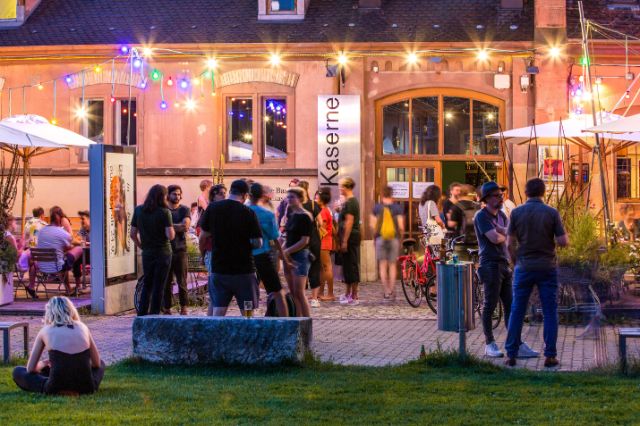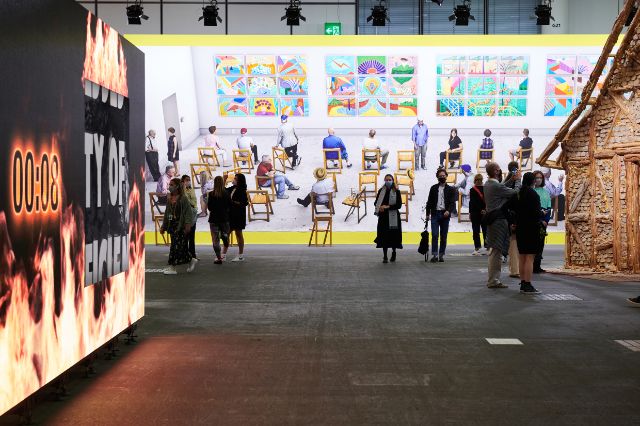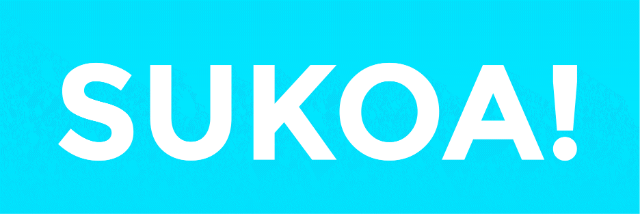
Pussy Riot am Tag des feministischen Streiks: "It is a very cruel moment to talk about pacifism right now"
Für das Punk und Performance Kollektiv Pussy Riot ist Protest eine Kunst. Und Revolt eine Lebensform. Am Dienstag, 14. Juni spielen sie in der Kaserne ihre Performance von Riot Days, eine theatralische Adaption des gleichnamigen Buches von Maria Alyokhina, welche darin ihre Erfahrungen in zwei jähriger russischer Gefangenschaft aufarbeitet. von Mirco Kaempf
Pussy Riot // Interview mit Olga Borisova
Das russische Punk und Performance Kollektiv spielt am 14. Juni in der Kaserne eine Adaption von Riot Days. Wir sprachen mit Olga Borisova, actress im Stück und creative editor des Buches Riot Days.
Es ist das erste Mal in drei Jahren, dass Pussy Riot wieder auf Europatournee sind. Und doch ist es gerade jetzt so passend: mit dem grossflächigen Angriffskrieg von Russland gegen die Ukraine erhält der Stoff von Riot Days erneut eine traurige Brisanz. Das Buch, geschrieben von Pussy Riot Mitglied Maria "Masha" Alyokhina reflektiert die Arbeit der Band, die Umstände der Entstehung und die Konsequenzen ihres Tuns. Nach dem berühmten "Punk Prayer" in der Christ-Erlöser-Kathedrale von 2012, einer der grössten christlich orthodoxen Kirchen der Welt, wurden Members der Band in einem langen (und im russischen Fernsehen übertragenen) Prozess zu zwei Jahren Gefangenschaft verurteilt. Doch der Protest ging weiter. Oder wie ein signature slogan der Band sagt: Anyone can be Pussy Riot.
Die Riot Days Tour diene zum einen, Geld für das Ohmatdyt Kinderspital in Kiew zu sammeln. Zum anderen, den Finger auf die Wunde zu legen: Putin sei ein Diktator, Faschist und Psychopath. Und der Westen verstecke sich hinter pazifistischen Argumenten, sagt uns Olga Borisova im Interview. Sie ist Teil von Pussy Riot und arbeitete zusammen mit Maria Alyokhina an Riot Days. Wir sprachen mit ihr vorab des Konzertes, welches am Dienstag 14. Juni in der Kaserne Basel stattfinden wird. Riot Days wird betitelt als eine revolutionary electronic punk opera.
"Everybody has a right to protest and has a voice. And this voice needs to be heard. I believe in personal stories and I believe personal stories can change the world. And definitely art can change the world" Olga Borisova
How has your tour been? Are you happy with reception and has the audience reacted as you hoped?
It's been already one and a half months of the tour and we are super excited because we meet so many people. The audiences are great and its lovely to see their reactions and solidarity. It gives us so much energy and hope because we want to fight against dictatorship together with the whole world.
When the audience cheers and applauds. What do you think they are applauding?
We have this moment in the show where we are saying "Russia will be free". It's not like the end of the show or anything but foreign audiences are really responding to it. Shouting and applauding. They feel for us. Even though they are Europeans they feel the struggle. And it's great to feel like we are all together in this and that we are allies. After the show, we are signing t-shirts and books and we get feedback. And it's great to talk about such issues and it's great to see they care about the war in Ukraine and that they want to support or donate or influence their politicians.
Do you think there is a difference between art and protest?
For us it's never been separated. What we are doing is political art. We chose this form to express our messages. I don't want to talk about "should all art be political" but I prefer political art. Because I am a political person and this is what touches me.
Do you consider Putin to be a fascist?
Yeah, I think he's a fascist. He's basically killing innocent people just because they don't want to obey his plans. He has this weird obsession with the Soviet Union and he doesn't care about the consequences. There's so many victims already. He's a murderer. He's a fascist. He's a psycho.
I'm sure you get this question a lot. But let me ask you this as well: Why are you not afraid of prison or violence?
Yeah, a lot of people are asking "why are you not afraid" but I think you should worry about Ukrainians right now. Not us. We are abroad right now, we are doing concerts, we have media attention etc. But innocent Ukrainians are now in constant danger. There are Russian political prisoners behind bars or are risking their freedom and life everyday protesting this war. They are in danger. It's not us you should worry about.
Do you believe in pacifism?
Pacifism is a very popular argument right now, to not help Ukraine. And I don't like it because this argument is used by politicians that refuse to send weapons. It is cruel and hypocritical right now to talk about pacifism. Because people are dying every day. They need help to protect themselves. You know I was 100% Pacifist before February 24th. After Putin started the war for me it was also a crash of my ideologies at some point. Right now, I am pro sending weapons to Ukraine because they need it. And they are asking for it. It is a very cruel moment to talk about Pacifism right now.
On Tuesday you are playing in Switzerland, one of the richest countries in the world who identify as politically neutral. What do you expect Switzerland to do against this war?
I expect Switzerland to help fight Putin. You are very known for your banks which are very protective of the assets of their clients. And there is a lot of Russian assets there. But those assets are stolen money. Stolen by Russian oligarchs and Putin’s gang, stolen from the Russian people. I think Switzerland could work with that. Because with Putin’s gang it's all about money. And the system is not working for free.
You are playing on the 14th of June on the day of the feminist strike. In Switzerland women have only been allowed to vote since 1971 and are in some ways still systematically treated as 2nd class citizens. Would gender equality also mean less war in the world?
Yes definitely. Because to me, war is also a result of the patriarchy. And we should all fight against patriarchy. This is the same narrative that we fight against when we fight dictatorships. If you look at the history, 99.9% of dictatorships are male. The whole narrative about a "strong leader conquering the world etc." is a very patriarchal.
In your opinion, do you think a song can change the world?
I believe in the culture of revolution. I believe that communities are greater and stronger than governments. Take our show as an example: It's based on Masha's story about her choice. But we tell the story to inspire other people. You don't need to be a superhuman. Everybody has a right to protest and has a voice. And this voice needs to be heard. I believe in personal stories and I believe personal stories can change the world. And definitely art can change the world. And culture.
Thank you for this interview!





.png/jcr:content/magnolia-medium.png)

